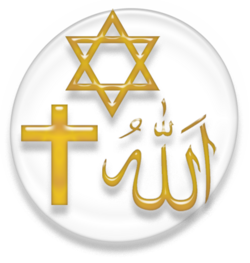
Join local religious leaders and experts as they address the topic “Are You Godwired? High Tech + High Touch: The Future of Interfaith Dialogue” at the Oklahoma Center for Community and Justice’s 2013 Interfaith Trialogue Series in February.
Sponsored by OCCJ and funded in part by the Tulsa Library Trust’s Alfred E. Aaronson Lecture Series Endowment, the three-part discussion series is scheduled on Sundays, Feb. 3, Feb. 10 and Feb. 17 from 2 to 4 p.m. at varying locations. A 30th Anniversary Dinner will be held after the last session on Feb. 17.
The Rev. Dr. Bill Crowell, associate minister at Boston Avenue United Methodist Church and Trialogue chairman, will moderate each discussion. The programs are free and open to the public. Donations are welcome.
· Session 1, “The Data Stream of Faith,” Feb. 3, 2-4 p.m., Charles Schusterman Jewish Community Center, 2021 E. 71st St. – We live in a fractious, polarized universe. Experts will provide trends, data and demography on religious life in contemporary America from the agitated margins to the center. Speakers include: Lecia Brooks, Southern Poverty Law Center, and Dr. Charles Kimball, presidential professor and director of religious studies, University of Oklahoma in Norman.
· Session 2, “High-Touch Dialogue for Today,” Feb. 10, 2-4 p.m., Peace Academy, 4620 S. Irvington Ave. – In an era of angry extremism, does dialogue still have worth and value? Can people of faith come together face-to-face to talk honestly with each other about their similarities and differences? Speakers include Sister Jane Comerford, director, Osage Forest of Peace; Dr. Don Pittman, Phillips Theological Seminary; Imam Arthur Farahkhan, Muslim American Community of Tulsa; Priscilla Galstaun, Islamic Society of Tulsa; Dr. Joli Jensen, Congregation B’nai Emunah; and Jeanne Jacobs, Temple Israel.
· Session 3, “High-Tech Global Dialogue,” Feb. 17, 2-4 p.m., Boston Avenue United Methodist Church, 1301 S. Boston Ave. – The brave new world of digital connectivity has now arrived. Can a photon express the love of God? Can a glowing screen be a place of holiness and shared experience? Speakers include: Sarah Morice Brubaker, Phillips Theological Seminary; Rachael Wagner, associate professor, department of philosophy and religion, Ithica College; and Ruman Sadiq from “Why Islam” series.
· Faith/Tech Fair and 30th Anniversary Dinner, Feb. 17, fair at 4 p.m., dinner at 6 p.m., Boston Avenue United Methodist Church – Celebrate the 30th anniversary of the Trialogue Series. Dinner tickets are $20 each. Call 918-583-1361 or email joaks@occjok.org for dinner reservations.
The Oklahoma Center for Community and Justice is dedicated to fighting bias, bigotry and racism. OCCJ promotes understanding and respect among all races, religions and cultures through advocacy, conflict resolution and education.
The Tulsa Library Trust’s Alfred E. Aaronson Lecture Series Endowment was initiated in 1969 on the occasion of Alfred E. Aaronson’s retirement from the Tulsa City-County Library Commission, the Gilcrease Museum Board and the Tulsa Community Relations Commission. Funds collected in his honor were dedicated to bringing authorities to the community to stimulate thought and action in fields where voids exist and offer other points of view.
For more information about the 2013 Interfaith Trialogue Series and/or 30th Anniversary Trialogue Dinner, visit www.occjok.org or call 918-583-1361.
*Image taken from http://www.newworldencyclopedia.org
A Selected Bibliography
2010 U.S. Religion Census: Religious Congregations & Membership Study: an Enumeration by Nation, State, and County based on Data Reported for 236 Religious Groups / Clifford Grammich. Kansas City, MO: Association of Statisticians of American Religious Bodies, 2012. (REFERENCE 200.973 T918)
Bohm, David. On Dialogue. London: Routledge, 2004. (401.41 B634o)
Careaga, Andrew. eMinistry: Connecting with the Net Generation. Grand Rapids, MI: Kregel Publications, 2001. (259.2 C18e)
Cobb, Jennifer. CyberGrace: the Search for God in the Digital World. New York: Crown Publishers, 1998. (215 C633c)
Dalai Lama XI. Toward a True Kinship of Faiths: How the World’s Religions Can Come Together. New York: Doubleday Religion, 2010. (201.5 B849t)
Forward, Martin. Inter-religious Dialogue: a Short Introduction. Oxford, England: Oneworld, 2001. (201.5 F779i)
Karabell, Zachary. Peace Be Upon You: the Story of Muslim, Christian, and Jewish Coexistence. New York: Knopf, 2007. (201.5 K143p)
Mackenzie, Don. Religion Gone Astray: What We Found at the Heart of Interfaith. Woodstock, VT: Skylight Paths Publishing, 2011. (201.5 M199r)
McLaren, Brian. Why Did Jesus, Moses, the Buddha, and Mohammed Cross the Road?: Christian Identity in a Multi-Faith World. New York: Jericho Books, 2012. (261.2 M222w)
My Neighbor’s Faith: Stories of Interreligious Encounter, Growth, and Transformation / edited by Jennifer Howe Peace, Or N. Rose and Gregory Mobley. Maryknoll, NY: Orbis Books, 2012. (201.5 M99)
Niebuhr, Gustav. Beyond Tolerance: Searching for Interfaith Understanding in America. New York: Viking, 2008. (201.5 N551b)
Patel, Eboo. Sacred Ground: Pluralism, Prejudice, and the Promise of America. Boston: Beacon Press, 2012. (204.5 P272s)
Rice, Jesse. The Church of Facebook: How the Hyperconnected are Redefining Community. Colorado Springs, CO: David C. Cook, 2009. (248.4 R363c)
Rosen, Jonathan. The Talmud and the Internet: a Journey Between Worlds. New York: Farrar, Straus and Giroux, 2000. (296.1206 R722t)
Thomas, Adam. Digital Disciple: Real Christianity in a Virtual World. Nashville: Abingdon Press, 2011. (248.483 T361d)
Veith, Gene Edward. Christians in a .com World: Getting Connected Without Being Consumed. Wheaton, IL: Crossway Books, 2000. (261.5 V538c)